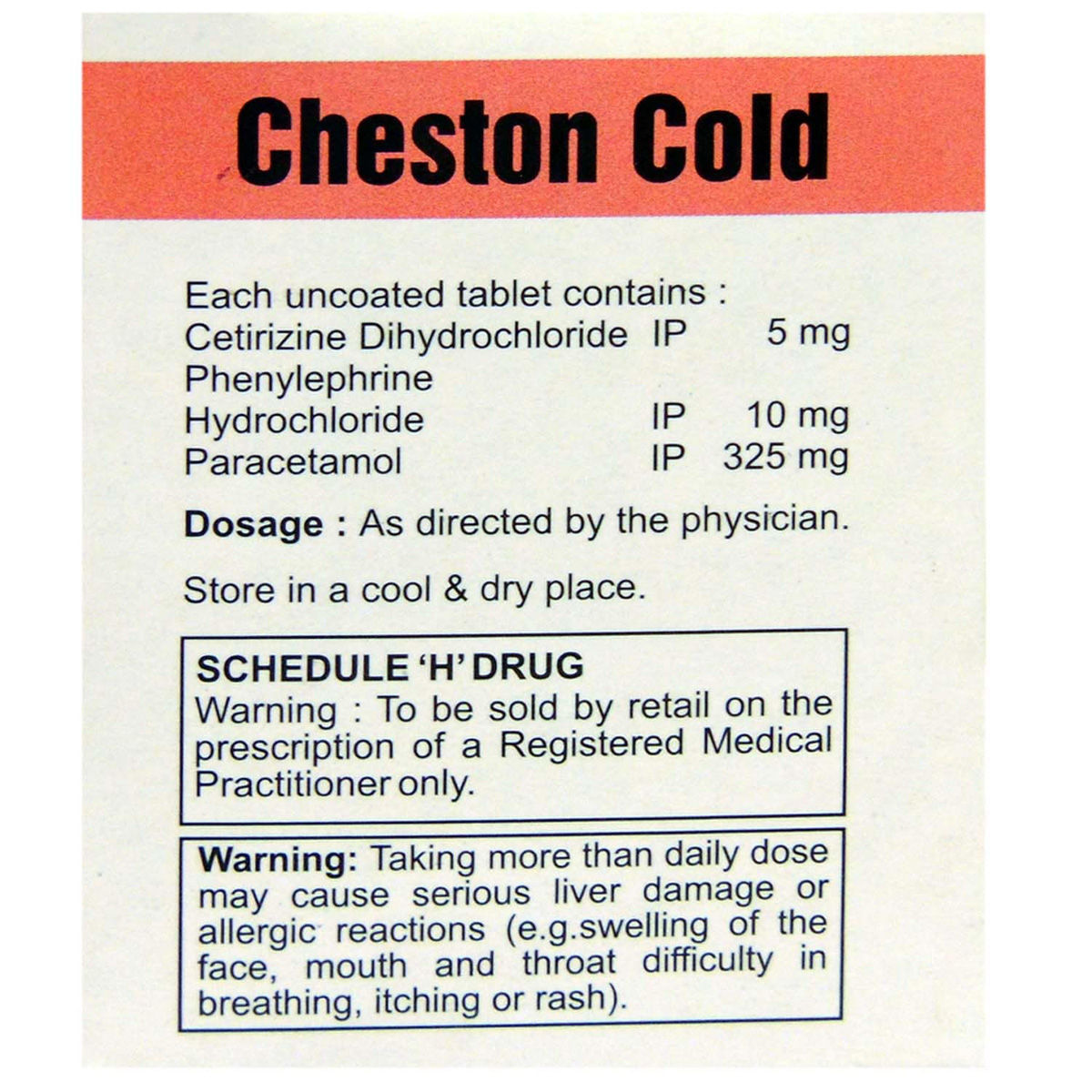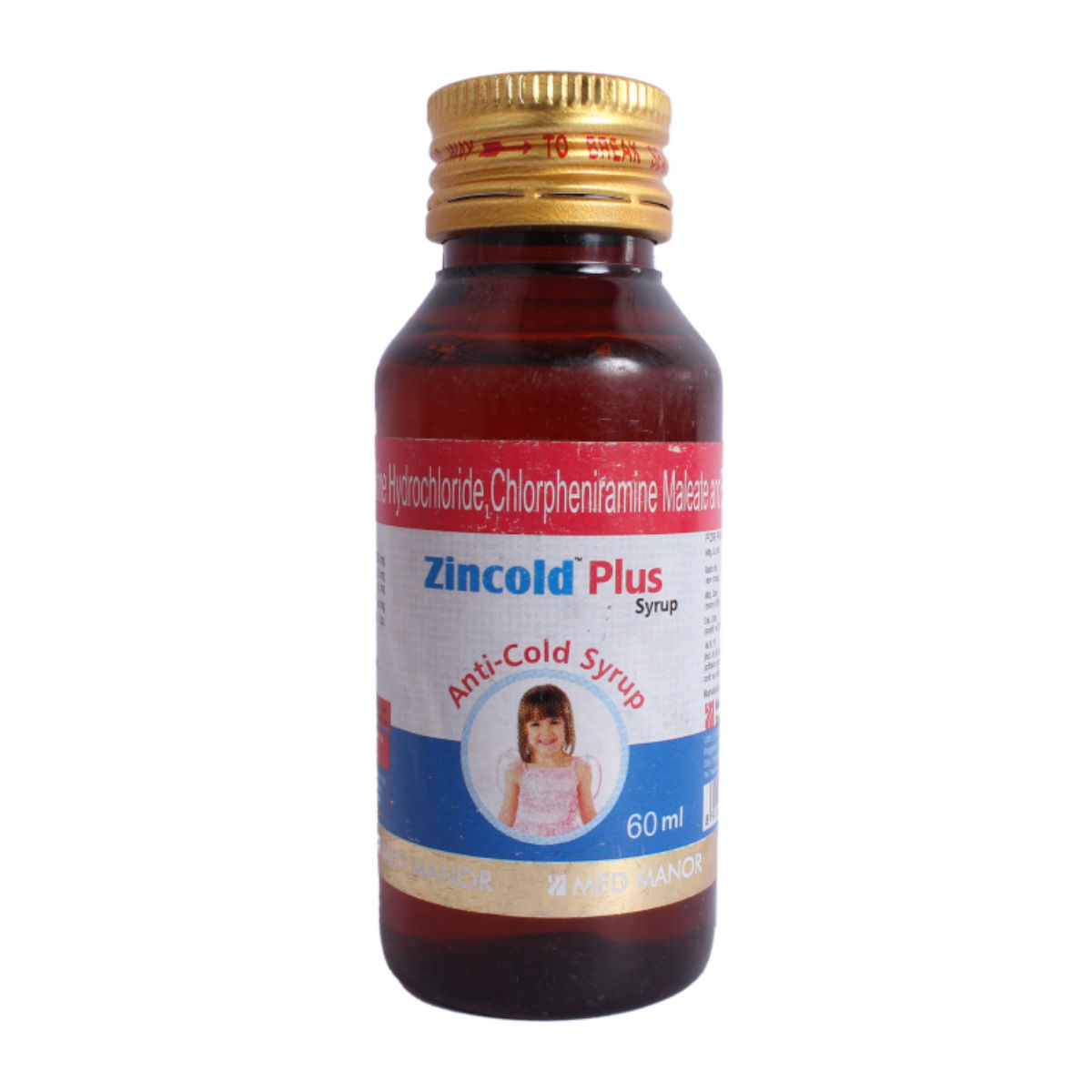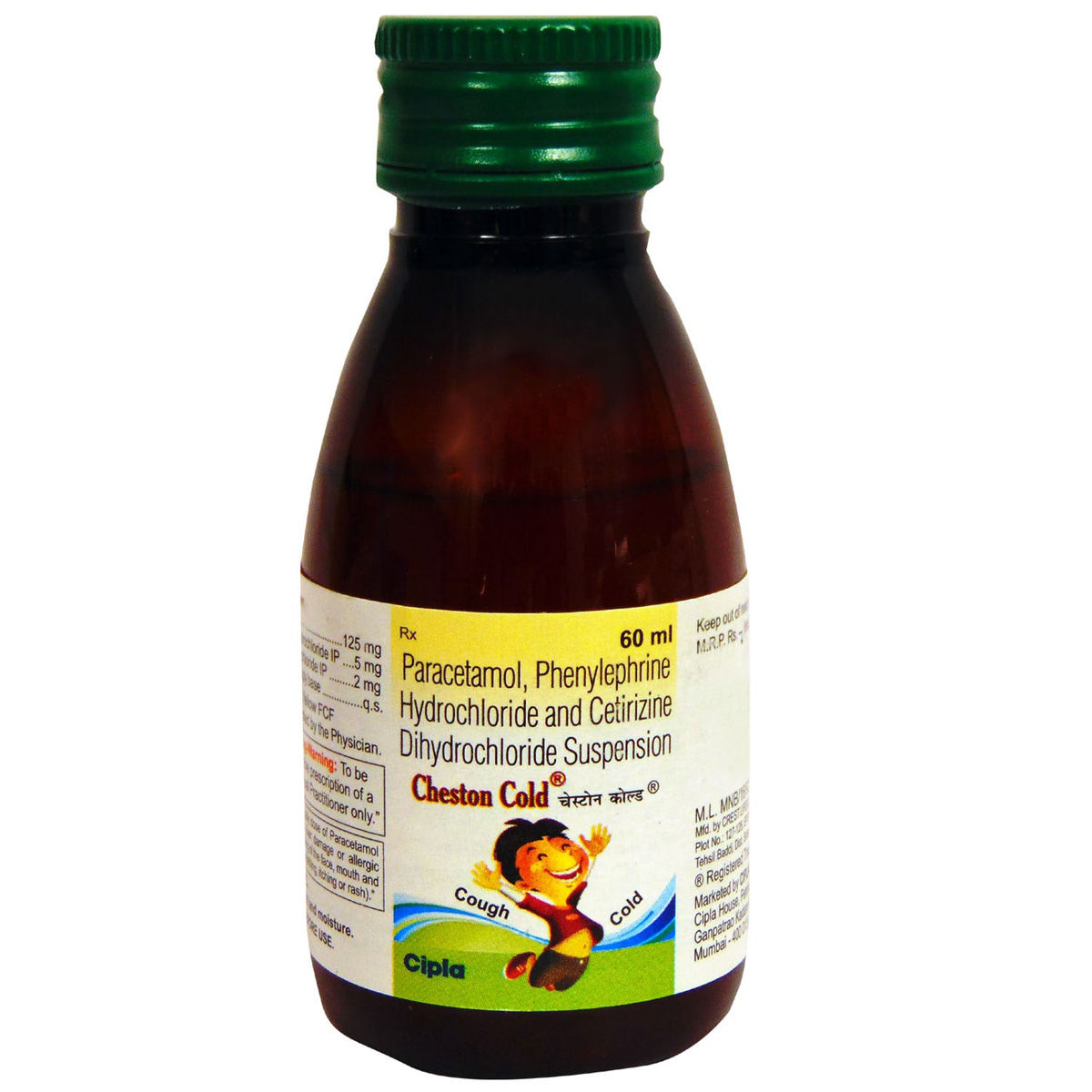Phenylephrine+paracetamol+cetirizine
About Phenylephrine+paracetamol+cetirizine
Phenylephrine+paracetamol+cetirizine belongs to a category of 'cough and cold medications' primarily used to treat the common cold and allergic symptoms like sneezing, watery eyes or itchy/watery nose and throat. The common cold is a respiratory illness affecting the nose and throat, mostly caused by viruses known as 'rhinovirus'. The virus attacks the body through the mouth, nose, or eyes and spreads quickly through droplets in the air when a sick person sneezes, coughs or talks.
Phenylephrine+paracetamol+cetirizine contains Cetirizine (antihistamine/antiallergic), Phenylephrine (decongestant) and Paracetamol (mild analgesic and antipyretic). Cetirizine belongs to the class of antihistamines (antiallergic drugs) that works by blocking the action of histamine, a substance responsible for causing allergic reactions. It helps relieve allergy symptoms such as sneezing, running nose, watery eyes, itching, swelling, congestion, or stiffness. Phenylephrine helps shrink the blood vessels in the nasal passage, reducing a stuffy nose. Paracetamol is an analgesic (relieves pain) and antipyretic (reduces fever) that works by inhibiting the production of certain chemical messengers in the brain known as 'prostaglandins' responsible for pain and fever.
Phenylephrine+paracetamol+cetirizine should be taken as prescribed by the doctor. Your doctor will recommend how often you take Phenylephrine+paracetamol+cetirizine based on your medical condition. Some people may experience drowsiness, nausea, fatigue, dryness in the mouth, headache, and vomiting. Everyone doesn't need to experience the above side effects. Most of these side effects of Phenylephrine+paracetamol+cetirizine do not require medical attention and gradually resolve over time. However, if the side effects persist or worsen, please consult your doctor.
Inform your doctor if you are pregnant, planning for pregnancy or breastfeeding before starting Phenylephrine+paracetamol+cetirizine. If you have high blood pressure (hypertension), liver or kidney disease, or coronary artery disease (heart disease), avoid using Phenylephrine+paracetamol+cetirizine as it may worsen your condition. Consumption of alcohol should be avoided as it may lead to excessive drowsiness and sleepiness. Do not take Phenylephrine+paracetamol+cetirizine if you have taken an MAO inhibitor (anti-depressant medication like Isocarboxazid, Phenelzine, Selegiline and Tranylcypromine) in the last 14 days. Intake of more than 4 gm of paracetamol can damage your liver, so it is better to avoid the use of Phenylephrine+paracetamol+cetirizine in severe liver damage. Cetirizine present in the Phenylephrine+paracetamol+cetirizine can make you sleepy, so do not drive or operate heavy machinery after taking Phenylephrine+paracetamol+cetirizine. Phenylephrine in Phenylephrine+paracetamol+cetirizine should be used with caution in patients with occlusive vascular disease (nerve/artery blockage), including Raynaud's phenomenon (decreased blood flow to the fingers).
Uses of Phenylephrine+paracetamol+cetirizine
Medicinal Benefits
Phenylephrine+paracetamol+cetirizine is primarily used to treat the common cold and allergy symptoms such as runny nose, blocked nose, sneezing, congestion, pain & fever. It is composed of three medicines, namely, Cetirizine (antihistamine), Phenylephrine (decongestant), and Paracetamol (mild analgesic and antipyretic). Cetirizine belongs to the class of antihistamines (anti-allergic drugs) that works by blocking the action of histamine, a substance responsible for causing allergic reactions. It helps relieve allergy symptoms such as sneezing, running nose, watery eyes, itching, swelling, congestion, or stiffness. Phenylephrine helps shrink the blood vessels in the nasal passage, reducing a stuffy nose. Paracetamol is a mild analgesic (relieves pain) and antipyretic (reduces fever) that works by inhibiting the production of certain chemical messengers in the brain known as 'prostaglandins' responsible for pain and fever.
Directions for Use
Storage
Side Effects of Phenylephrine+paracetamol+cetirizine
- Drowsiness
- Nausea
- Fatigue
- Dryness in the mouth
- Headache
- Vomiting
Patients Concern
Disease/Condition Glossary
Common cold: The common cold is an infection caused by a virus known as 'rhinovirus' affecting your nose and throat (upper respiratory tract). Children younger than six years of age are at the most significant risk of colds, but healthy adults can also be affected to have 2-3 colds annually. In most cases, cold symptoms are recovered within a week or ten days. However, symptoms might last longer in people who smoke or are exposed to allergens like dust, pollutants, etc. Common cold symptoms might include stuffy or runny nose, sore throat, cough, congestion, mild body pain or a mild headache, sneezing, low-grade fever, and feeling unwell (malaise). In some cases, the discharge from your nose may become thicker and yellow or green, which does not indicate a bacterial infection. If you observe these symptoms, immediately contact your doctor.
Allergies: This is a condition that occurs when allergy-causing agents known as 'allergens' attacks our body, thereby causing symptoms like redness, stuffy nose, watery eyes, excess mucus formation, airways irritation, itchy and watery nasal passage/throat. During the allergic condition, our body secretes a lot of chemical messengers called 'histamines', which in turn cause all these allergic symptoms. Allergies can be caused due to various chemicals, air pollutants, dust, pollen grains of plants, pet danders, hairs and multiple medicines.
FAQs
Phenylephrine+paracetamol+cetirizine is composed of three medicines, namely Cetirizine (antihistamine), Phenylephrine (decongestant), and Paracetamol (analgesic and antipyretic). Cetirizine belongs to the class of antihistamines (anti-allergic drugs) that works by blocking the action of histamine, a substance responsible for causing allergic reactions. It helps relieve allergy symptoms such as sneezing, running nose, watery eyes, itching, swelling, congestion, or stiffness. Phenylephrine helps shrink the blood vessels in the nostrils and the passage and reduces stuffy noses. Paracetamol is an analgesic (relieves pain) and antipyretic (reduces fever) that works by inhibiting the production of certain chemical messengers in the brain known as 'prostaglandins' responsible for pain and fever.
Yes, Phenylephrine+paracetamol+cetirizine contains cetirizine, which is an antihistamine that is known to cause dry mouth. Increase the intake of fluids to avoid excessive dry mouth caused due to Phenylephrine+paracetamol+cetirizine as continued dryness can lead to dental disease (gum disease, fungal infection, tooth decay).
No, you are not recommended to take Phenylephrine+paracetamol+cetirizine with warfarin as co-administration of these two medicines may increase bleeding risk more easily. However, if you notice blood in urine or stools, dizziness, unusual bleeding or bruising, vomiting, weakness, or headache, please consult a doctor immediately. If you are supposed to use these medicines together, you are advised to contact your doctor so that the dose may be adjusted appropriately to use safely.
It is not recommended to take Phenylephrine+paracetamol+cetirizine along with any anti-depressant medication as it contains phenylephrine, which is known to be contra-indicated with anti-depressant medications, especially MAO inhibitors. Also, Phenylephrine+paracetamol+cetirizine should be taken at least 15 days after your last dose of anti-depressants.
Yes, the Phenylephrine+paracetamol+cetirizine is known to cause nausea or vomiting. In case you are experiencing excessive nausea while consuming Phenylephrine+paracetamol+cetirizine, speak with your doctor immediately.
Yes, the Phenylephrine+paracetamol+cetirizine may cause drowsiness. It is not necessary for everyone taking Phenylephrine+paracetamol+cetirizine to experience this side effect. Therefore, avoid driving if you feel drowsy after taking Phenylephrine+paracetamol+cetirizine.








